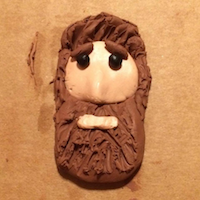The Hero's Motif in Ping Pong the Animation

Character Themes
Ping Pong already has a strong backing score. The music often matches the emotion of the scene, from pumped-up action to quiet sadness.
Each main character has an easily distinguishable musical motif that generally follows them through their arc.
Some characters even have multiple themes for different scenarios, connected via a similar melody or instrumentation. Kong’s character theme is bouncy, foreign, and proud. When playing a match, his second theme reflects his cut-throat desire to win and razor-sharp focus.
Compare this to Koizumi’s main theme, whose descending piano arpeggios and wistful strings reflect the old man’s wisdom and warmth. When it comes time for him to teach Smile a bitter lesson, the piano gets foreboding and dissonant. The strings are replaced with a periodic and high-pitched drone, almost like a siren.
That said, as impressive and effective as these motifs are, nothing compares to the Hero’s theme and how it is set up, reinforced, then paid off.
Smile and Peco
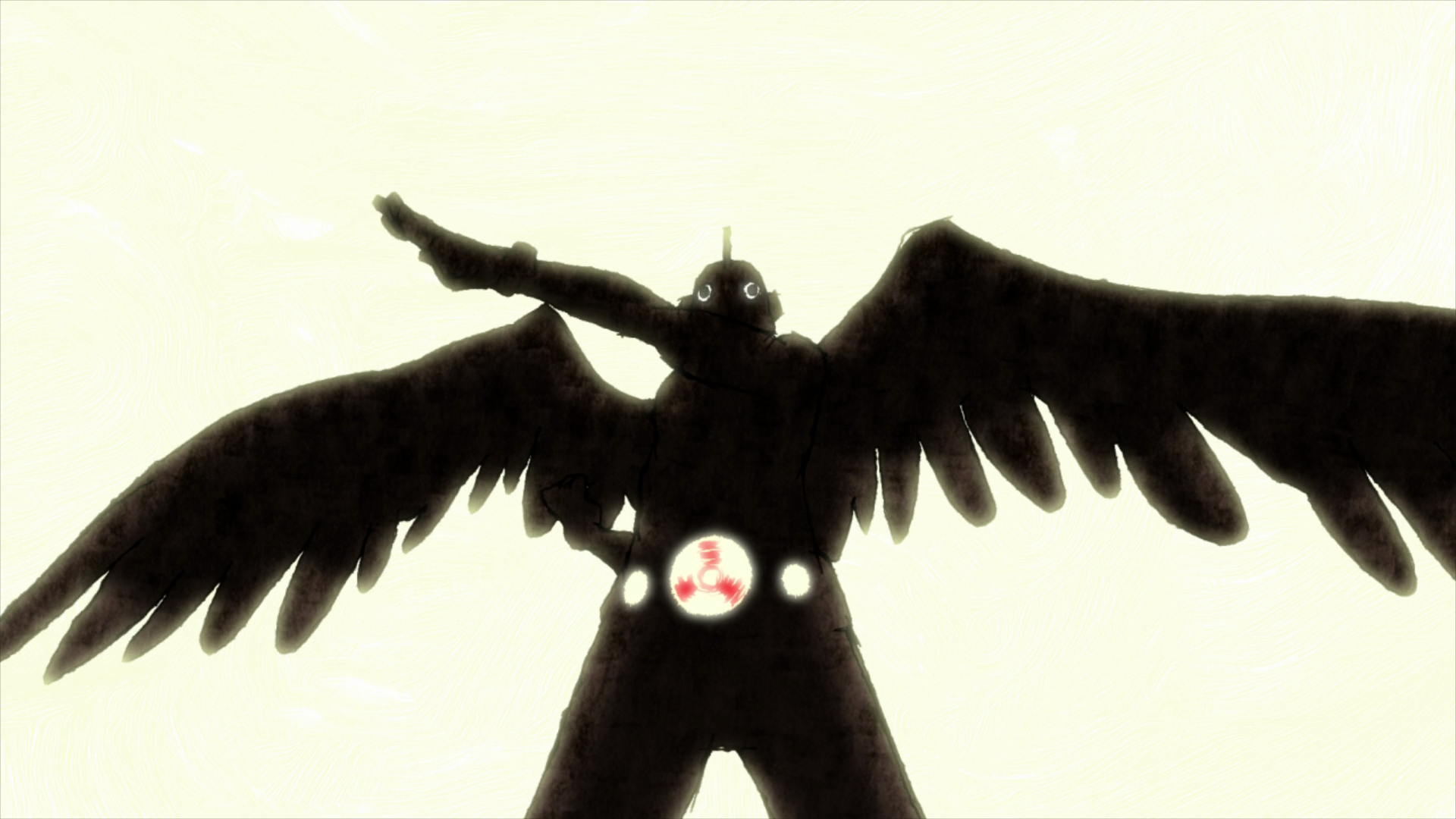
Let’s recap the story. Peppered throughout the show in flashbacks, it is revealed that Smile was often bullied as a child. When Peco befriended him and started fending off the bullies, Smile was not only grateful – he idolized Peco. It’s why Smile started playing ping pong in the first place.
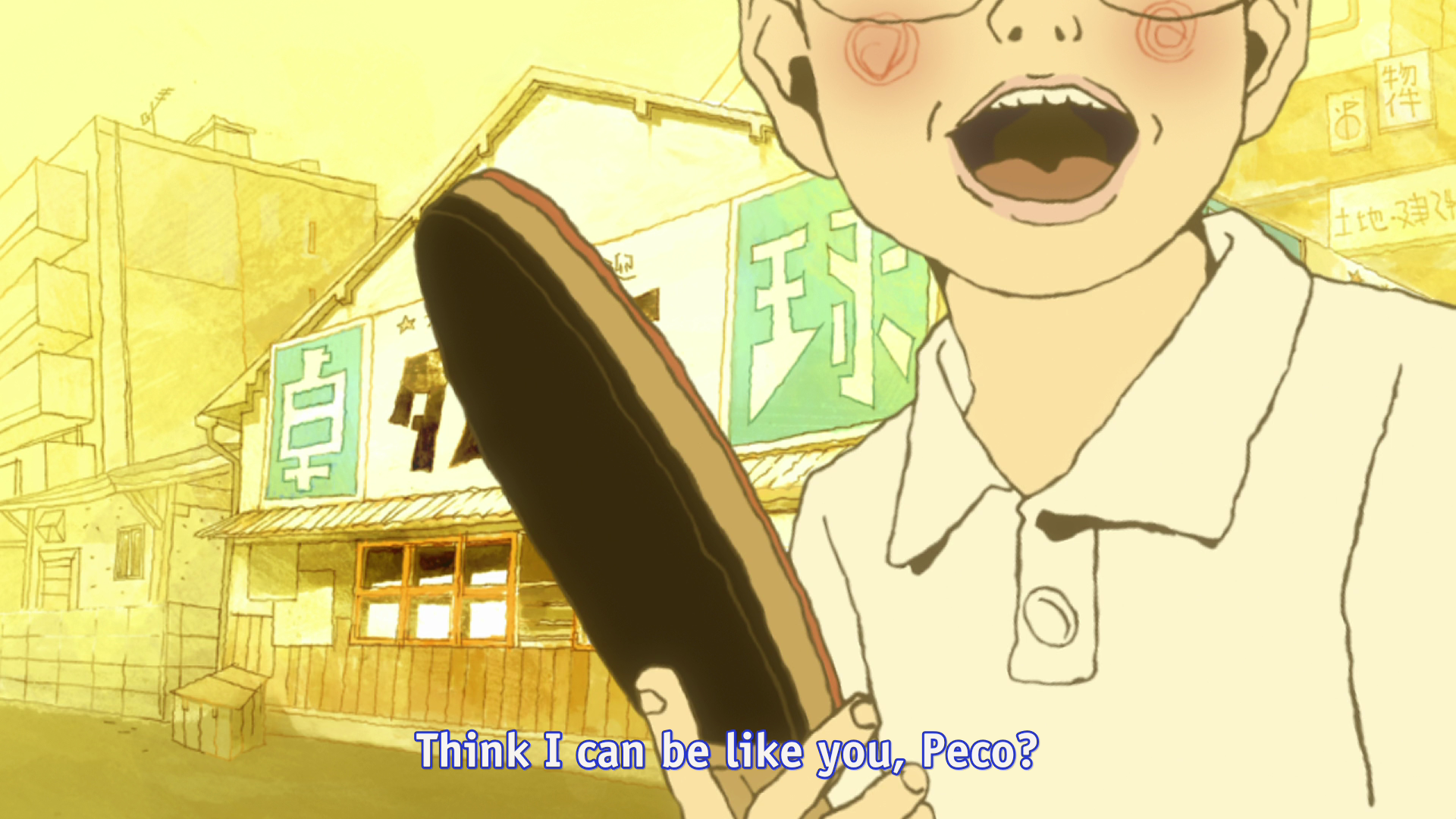
As a child, Peco often wore a mask and played at being a Hero. Whenever Smile would feel bullied, he would remember Peco’s instructions:
Call me when you’re in a pinch!
Chant this three times in your mind!
Enter the hero! Enter the hero! Enter the hero!
If you do that, I’ll come to you.
In Smile’s eyes, there was nothing pretend about this. As his frequent protector, best friend, and ping pong idol, Peco WAS the hero!
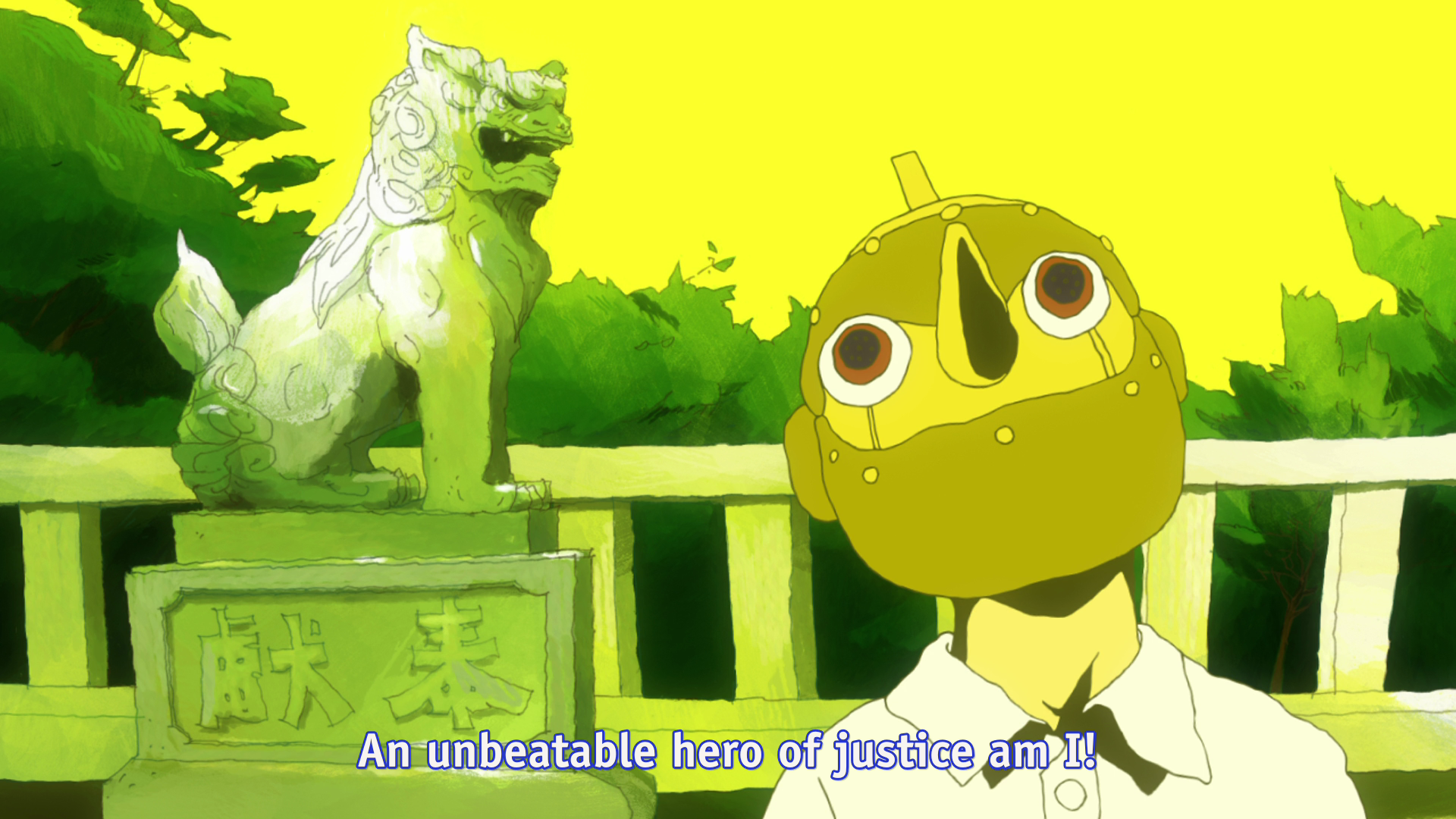
Snap to present, and Smile doesn’t see Peco as the hero anymore. Peco has lost sight of what made him inspirational, and has become lazy and complacent. The show then follows Peco as he falls behind his peers, hits rock bottom, rediscovers his love of ping pong, and reclaims his status as the hero.
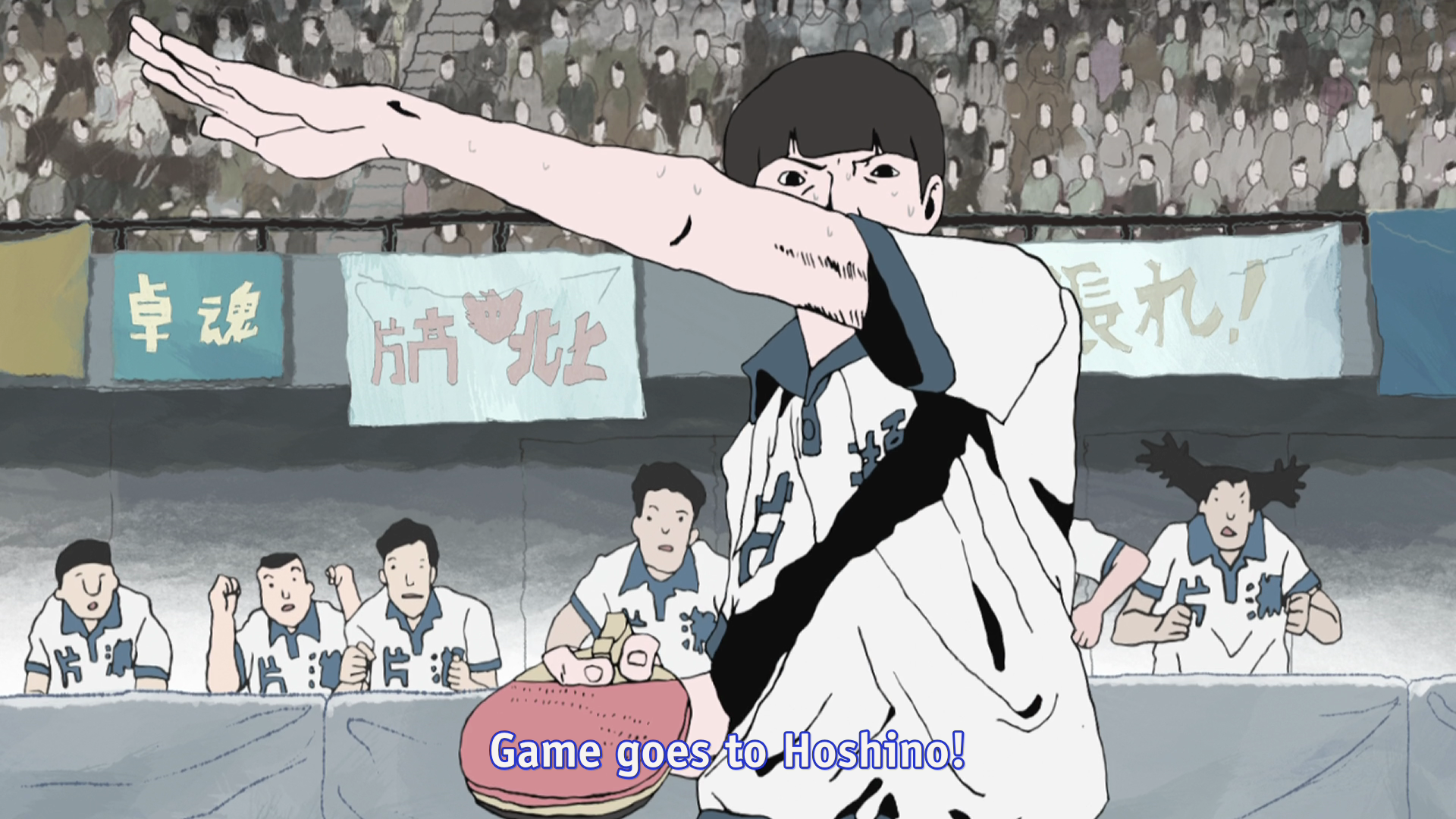
Meanwhile, we see Smile struggling to cope with the Hero’s absence. Why play ping pong? What’s the point? It is this “hero vacuum” that forces Smile to try and forge his own path forward as “The Robot”.
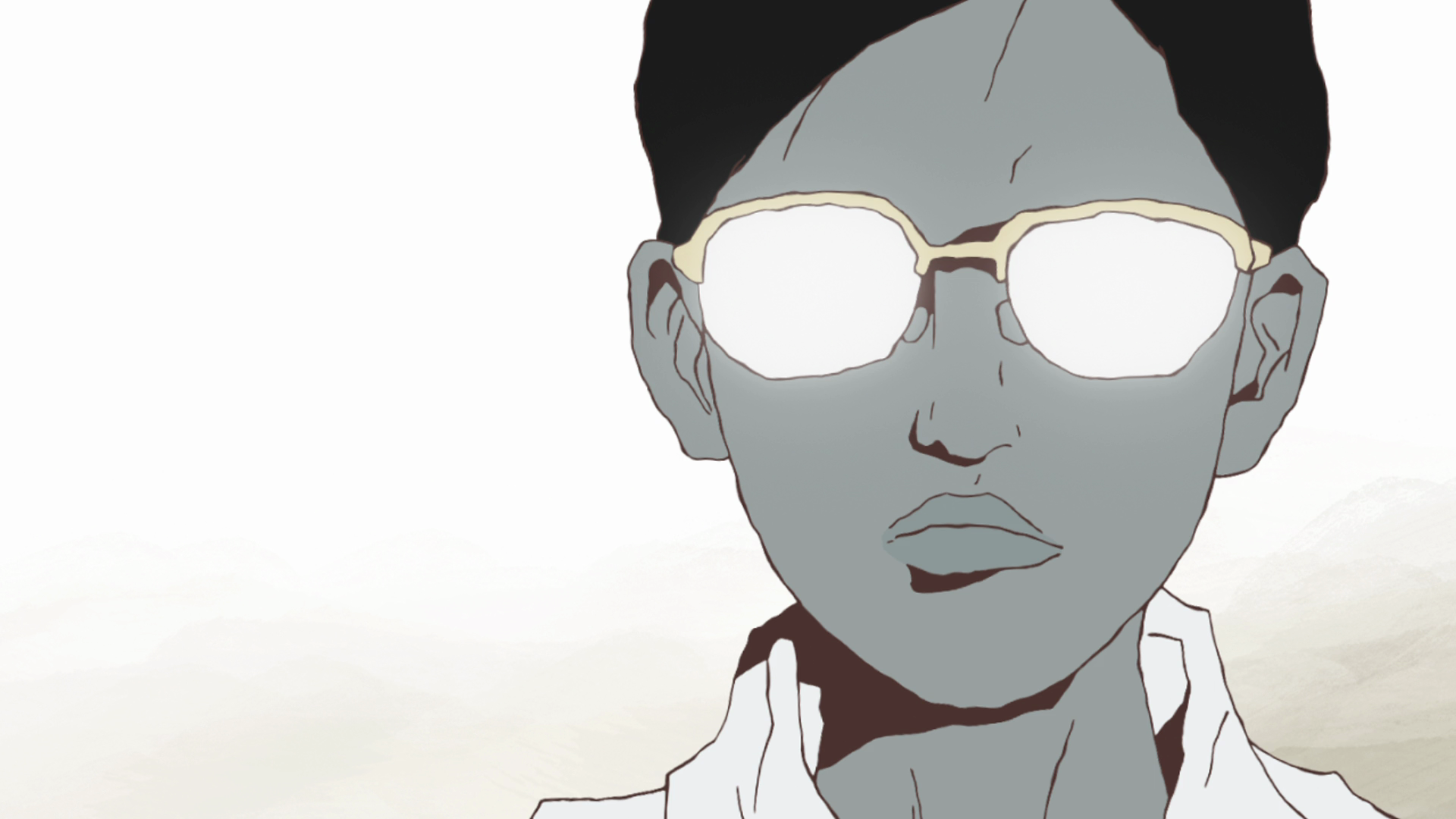
However, this way of living is clearly missing something. As we see in both Smile’s dialogue and the brief fantasy scenes mixed in, Smile’s only true salvation will come with the return of the Hero.
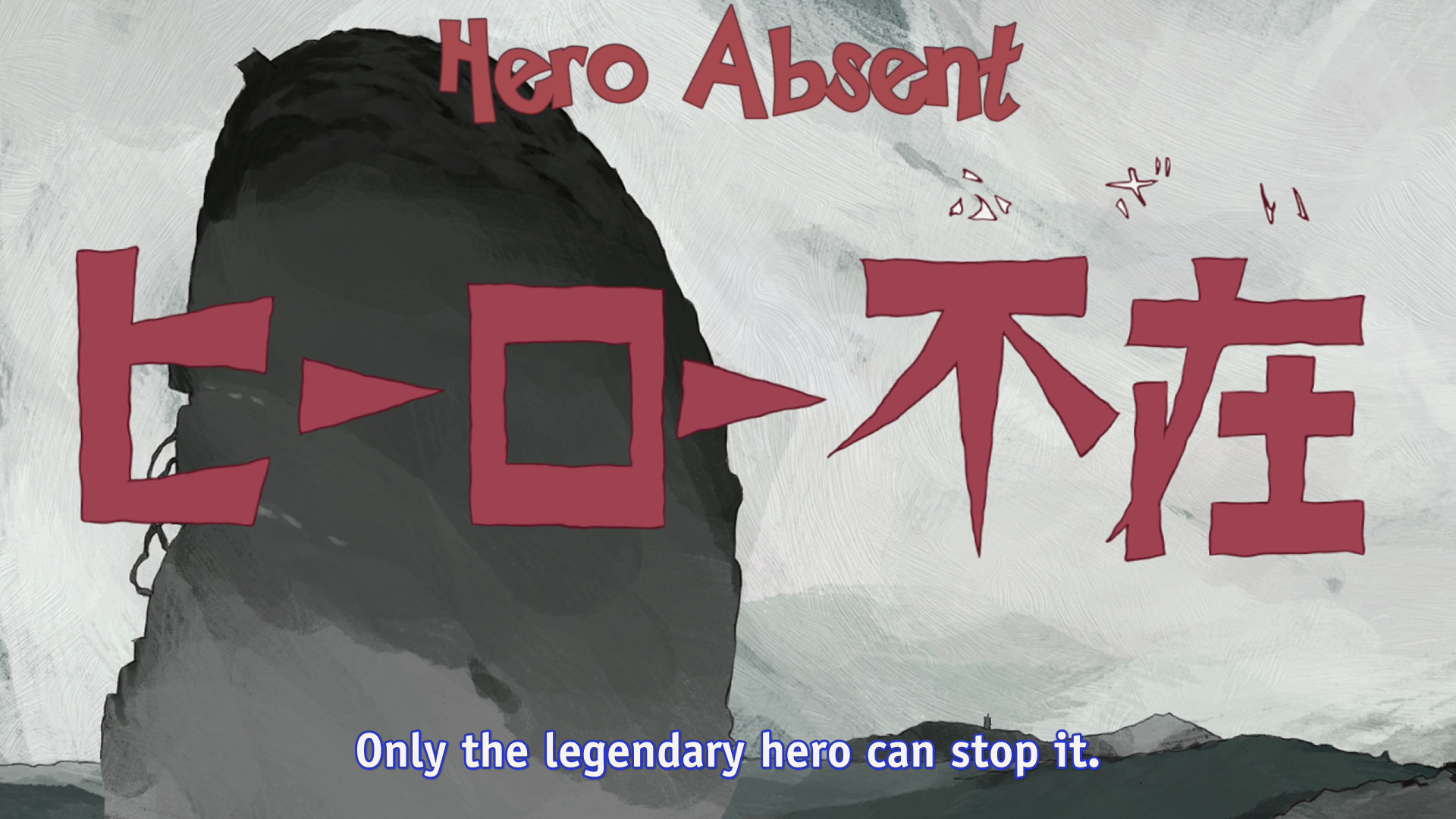
The Hero’s Motif
How does the music compliment this story? By establishing a specific melody as the Hero’s motif, and weaving it throughout the fabric of the show to represent key breakthroughs for our two main characters.
Throughout the first episode, Smile hums a simple tune to himself. After Peco is soundly defeated by Kong in the episode’s climax, he finally asks Smile about it:
Peco: What’s that?
Smile: Monster Robot
Peco: I mean the song.
Smile: Is it weird?
Peco: A little.
We learn later on in episode 10 that Smile came up with this song when they were children, as a theme song for the Peco’s hero persona. Peco has forgotton the tune completely, mirroring how he’s lost sight of what makes him good at ping pong, as well as what makes him the hero.
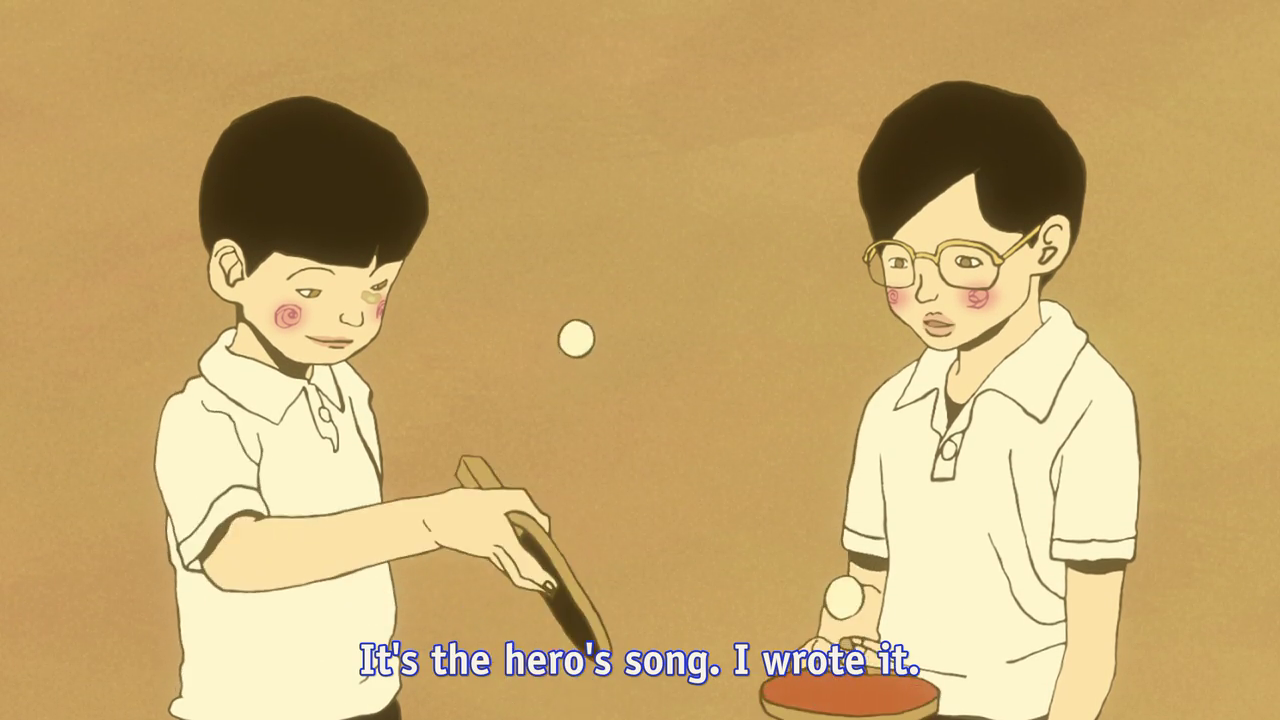
The reinforcement of the motif comes during Smile’s tournament match vs Kong Wenge in episode 3. At this point, Koizumi has convinced Smile to start practicing and has begun cultivating Smile’s competitive edge.
Using an unfamiliar paddle, Smile starts his match with Konge at a big disadvantage and quickly loses the first game. However, Smile doesn’t appear upset, nor is his coach Koizumi worried. As Smile starts to make his comeback, we hear him humming the same tune from episode 1. He is focused, he is trying, and he is having fun.
The stronger Smile gets, the more at peace he seems. He is approaching a zen-like enlightenment, while Peco as spectator becomes jealous and confused. Peco doesn’t recognize his friend Smile. Peco was supposed to be the hero, right? After getting skunked by Kong just two episodes prior, Peco’s only words are:
No way… Is [Smile] going to win?
The final turn of this battle is when an already demoralized Kong Wenge gets chewed out by his coach, who is also his translator and only friend. Smile cannot understand the language but clearly understands the stakes. The humming stops, and a sudden shift in the music accompanies a claustrophobic zoom. Smile’s not having fun any more.
Immediately, Smile loses his drive to win and sloppily hands the game to Kong. At this point, Smile just doesn’t care about winning. When he plays against Peco or Kong and sees their fragile ego and status laid bare, he hesitates to take that away from them. Why take this so seriously? As he says to Kazama earlier in the episode:
[I play] table tennis to kill time.
Devoting your life to table tennis is nonsense. It’s beyond comprehension. It’s creepy.
After this match and Koizumi’s strong scolding, Smile quickly transforms fully into the “emotionless” robot. For the next several episodes, he doesn’t hesitate to crush even former friends like Sakuma. Witnessing this, and feeling left behind, Peco is finally so discouraged he throws away his ping pong paddle.
With Peco hitting rock bottom in his own existential crisis, it’s fitting that the Hero’s Theme completely disappears for these middle episodes. So what will it take to bring it back?
After a pep talk from Sakuma and an off-screen epiphany (later revealed to be Smile’s enthusiastic grin in an old photo), Peco throws himself into training. He is finding himself again, but has not regained Hero status just yet. In the climatic tournament of the series, we see Peco breeze through his early opponents, including a cathartic rematch with Kong Wenge.
Smile can’t help but notice that the old Peco, his childhood hero, has finally returned.
Welcome back, hero.
But we don’t hear Hero’s theme for another two episodes. Why? Because Peco is still missing something, he just hasn’t figured it out yet.
The Hero’s Return
It is during the semi-finals match against Kazama that Peco is truly tested. After quickly losing 4 points in a very convincing fashion, Peco thinks this is his lowest point. His triumphant moment! He openly declares the start of his comeback.
He announces the Hero’s arrival, only to be immediately shut down and then lectured. Kazama, a veteran burdened by his success, can’t stomach Peco’s naivete. This false start is important, and shows that Peco is still immature, egoistic, and unaware. He continues to struggle and quickly loses the first two games.
Finally, Peco remembers that key bit of wisdom from his childhood. It’s not about being the best, the strongest, the hero. It’s so much more pure than that! It turns out… ping pong is fun!
During this epiphany, we hear Smile’s old humming tune slowly fade in. We see a flashback that explains its origins – Smile wrote it for Peco, as the Hero’s theme! Now through flashback, we hear the original rendition through the voice of a child.
We’ve seen the setup and reminder. Now for the payoff.
Up until this point, Peco hasn’t had a definable motif that was his own. His scenes either highlighted another character’s theme or borrowed from the standard library of background score. This is the true payoff of the show. On the official soundtrack, this song is titled simply, “Peco”.
Koizumi: Now I see. He’s a hero.
Enter the hero! The action zips by. The background and spectators, even the colors, start to fade as the two players become increasingly focused and wholly absorbed by the game. And nowhere is this sudden transformation as clear as the sudden shift in score.
It’s the same melody we heard from Smile earlier, but apply a faster tempo and interesting percussion, and it transforms into a spontaneous assault of sounds. Peco’s theme is childish, with the squeaking flute and bells and whistles. Peco’s theme is spirited, with the vocal ooo-ing and echoing and the occasional clapping on the beat. Peco’s theme is solid and powerful, with the electronic drone to center the chord alongside the strong percussive beat.
The payoff of the hero theme signals more than the conclusion of Peco’s arc. Remember, Peco was never a hero solely based on ping pong skills. It was his leadership and friendship that protected and inspired Smile.
Now it’s time for Peco to save Kazama.
Teaching Kazama to Fly
Despite his ominous exterior, Kazama is more tragic than directly antagonistic. He always cordial outside the match, and eagerly recognizes and respects Smile’s talent. As the internatonal champion, he’s less a rival and more of an obstacle to winning a tournament.
What makes Kazama villianous isn’t his behavior but his philosophy, what his lifestyle represents. As he reminds the audience in his lecture above, there is no joy in ping pong. There are no heroes, no shortcuts. Only hard work and responsibility.
So when Peco’s theme kicks in and the game starts to get close, Kazama is in denial.
The visual metaphors evolve. Kazama’s recurring climb up the endless mountain segues into a common scene for him: a bathroom. It is a callback to his many pre-match meditations, a reminder of his isolation and stress.
Suddenly, he looks up and opens his eyes. The hero appears and shows him a way out! But the hero’s duty is to lead, not to coddle. The hero withdraws his hand, so Kazama grows his own wings and takes flight.
For the first time in the series, Kazama starts enjoying the game.
All the while, Peco’s theme continues to play. This choice to continue the same audio from Peco’s comeback minutes ago links it emotionally to Kazama’s sudden change of heart. In another story, this would be a moment of tension: Kazama is starting to get some points again, the hero is losing his footing, the villian is making a comeback! By continuing Peco’s theme throughout, it’s telling us that this isn’t just another dramatic turn or reversal of fortune. We should cheer for Kazama just like we did for Peco. Kong Wenge spells it out for us: “This is a great game!”
As Kazama continues to grow, the color drains from the scene and the backgrounds disappear. He no longer cares about the outcome of the match, only the visceral sensation of playing. He has found a pure, almost enlightened state of peace.
All my cells are singing […] I don’t have time to be afraid
By the end of this scene, Peco’s theme has been playing for 6 minutes straight. After this, we don’t hear the hero’s theme again. The moment has passed, the story has been told. Peco’s theme was used exactly once, and it was used well.
What’s important is recognizing these 6 minutes of music accomplished. The scoring choice and setup served as an excellant payoff for Peco thematically. Perhaps more importantly, Peco’s theme established a shorthand that helped convey and sell the complex emotions of Kazama’s rapid enlightenment.
All so we can get from this emotion…
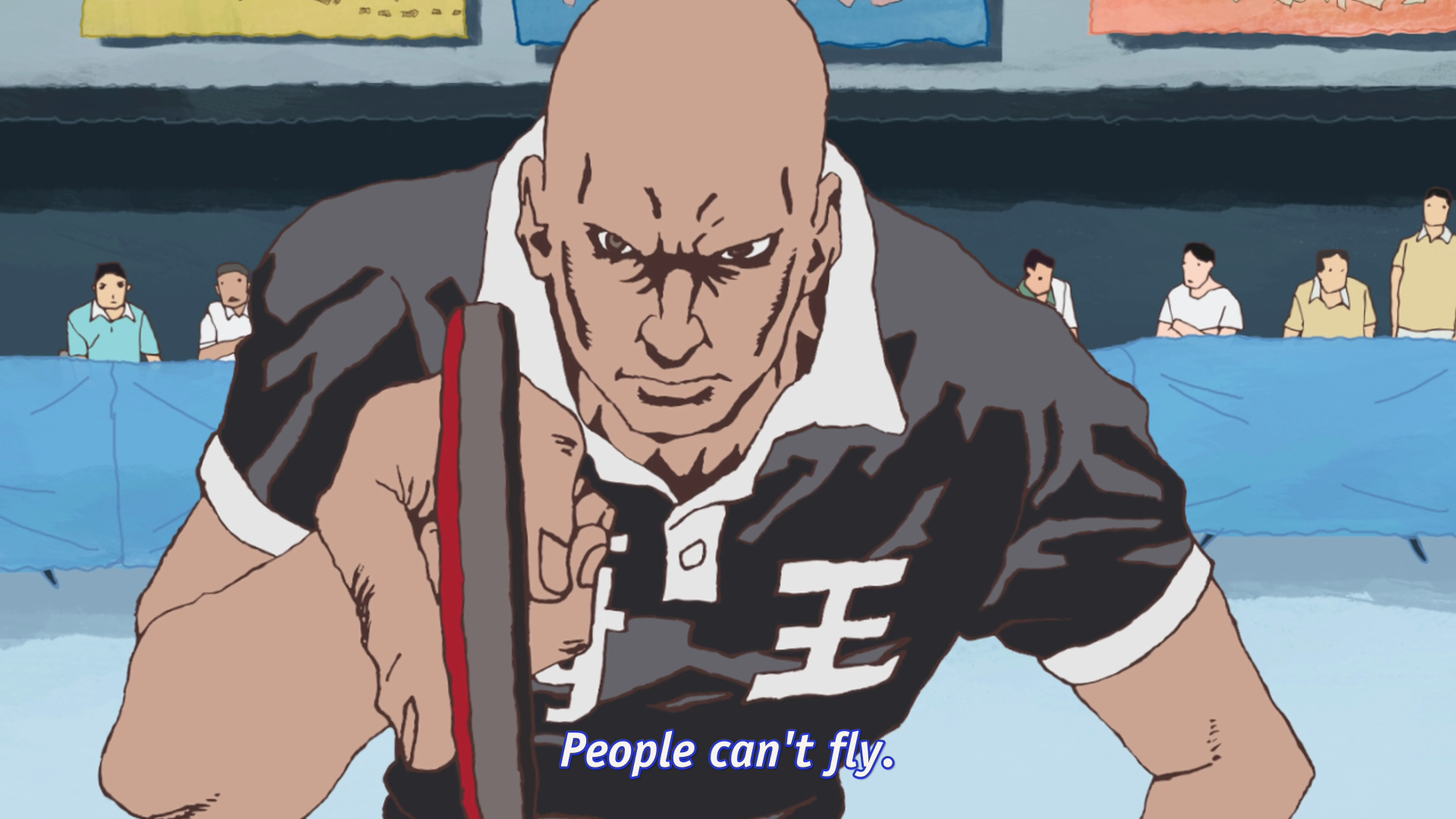
…to this one…
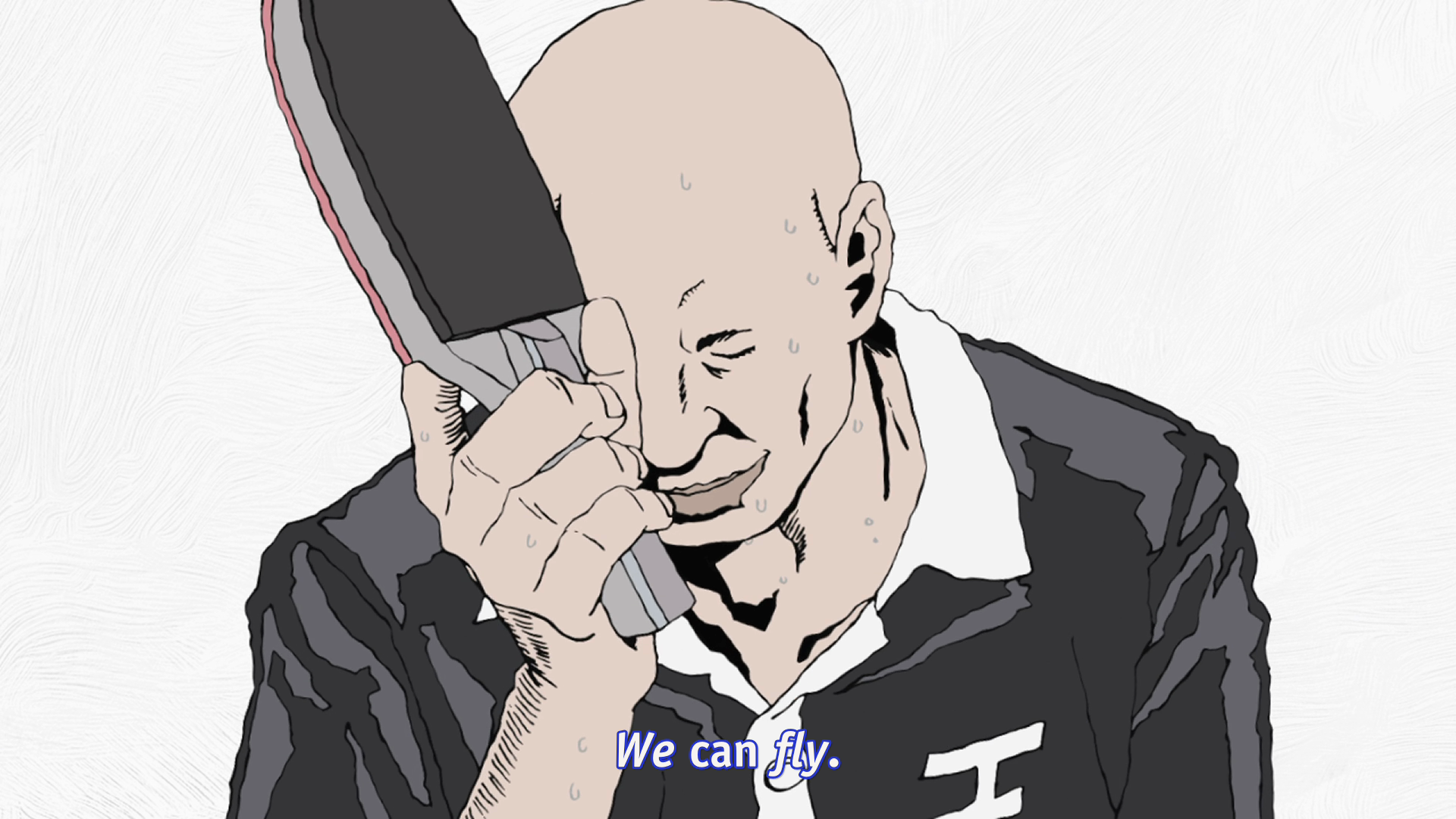
…in under 20 minutes and make it feel real.
Evolution of the Motif
What truly elevates the hero’s theme, beyond the clever setup and payoff, is its different manifestations / interpretations / arrangements as reflections of each character.
Peco’s theme mirrors his best qualities and aspirations, its loud and fast and triumphant. Smile’s slower lullaby represents his needs: the hero as protector and savior, an answer to the external noise and bullying, less a drug and more a salve.
Also worth noting is how the motif seamlessly switches from diegetic to non-diegetic, i.e. from occuring within the reality of the show to outside it. Smile’s humming is diegetic, because the characters are aware of it and even comment on it, unlike the backing score, which exists outside of the narrative and purely for audience’s benefit.
Motifs can be powerful tools for building emotional connections to the art or baking narrative associations into the subtext. But so rarely so you see a motif modified, let alone “adapted”, like Peco’s theme in Ping Pong. Right when Peco changes fundamentally as a character and his story arc peaks, the music changes with him for an effect that is deeply powerful.
When the motif transforms from the diegetic humming of a child’s fantasy to the pulsating soundtrack of the big match, the story of the Hero transforms into legend.
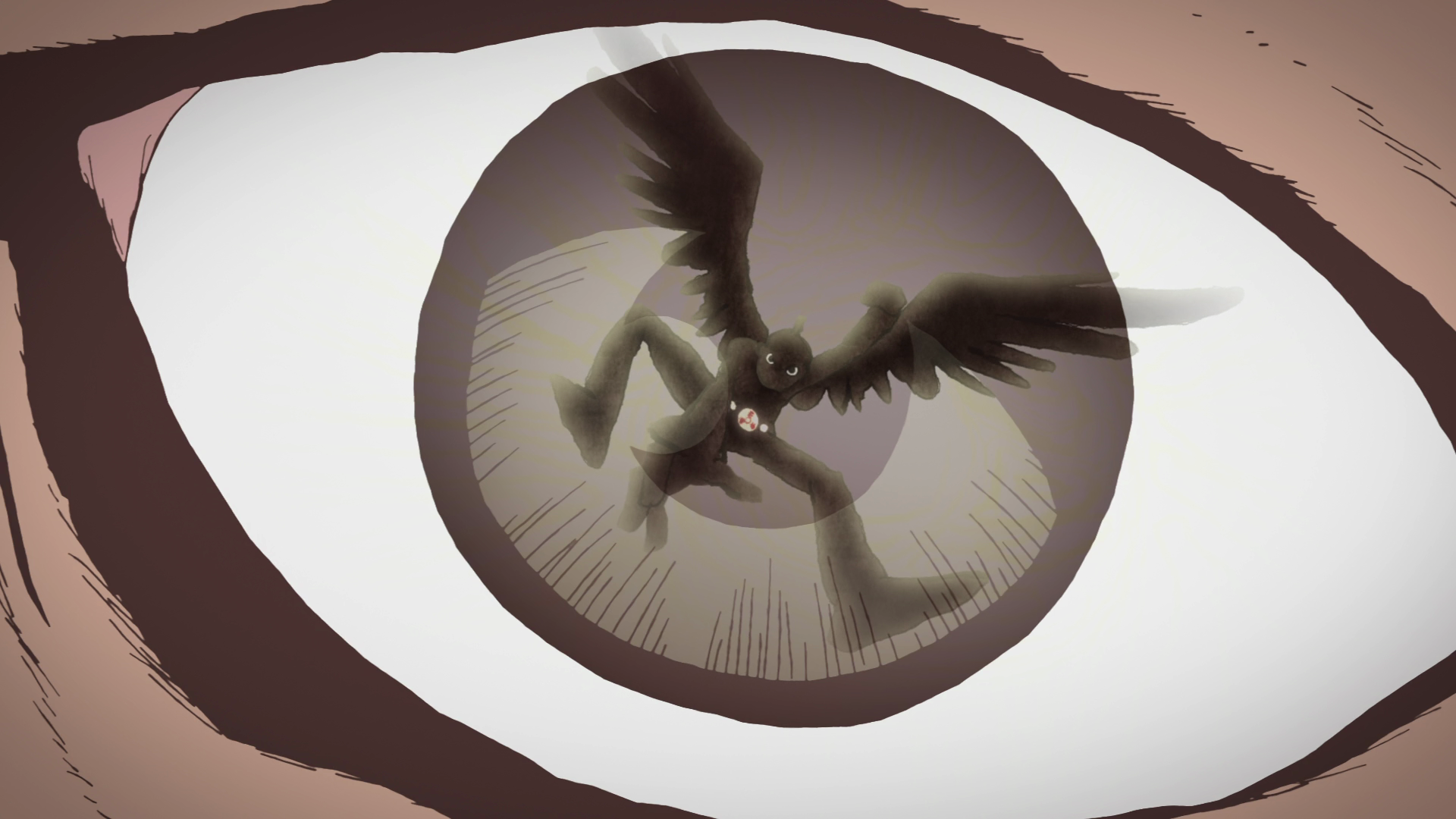
Post Script and Further Reading
- For a quick primer on digesis, check out this segment Lindsay Ellis made for her review of the Phantom of the Opera film adaptation.
- Lindsay Ellis also briefly discusses motif and its noticeable misuse in the first Hobbit film in her video essay The Hobbit: A Long-Expected Autopsy. The motif bit is time stamped, but the video and it’s follow ups are well worth your time.
Special thanks to Khalid, Matt, and Eliah for proofreading and providing feedback <3
If you have a favorite show or movie, where you feel the score greatly elevated the storytelling, please drop me a line @mpaulweeks! I’d love to hear about it.
